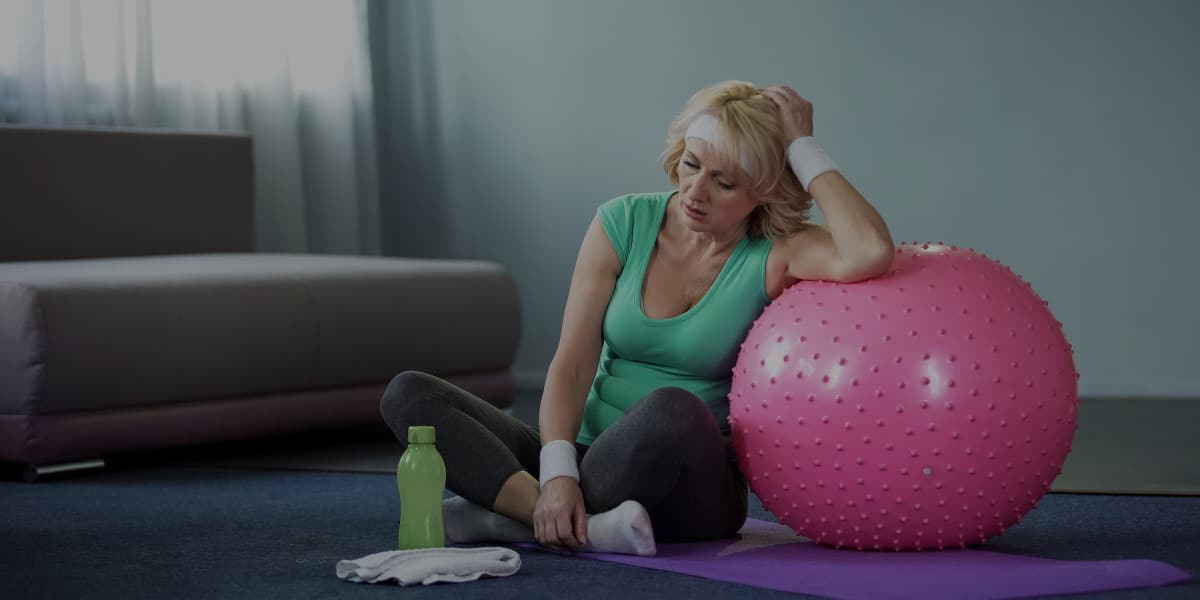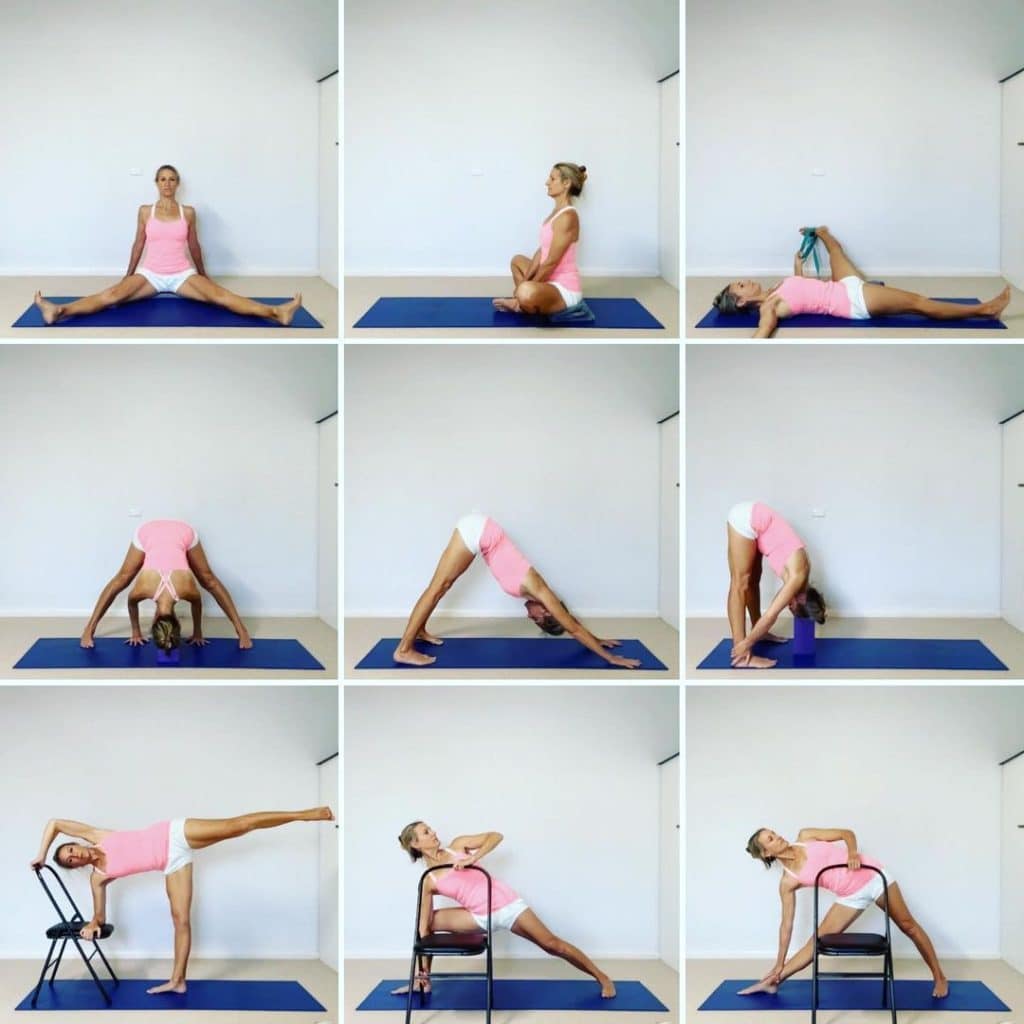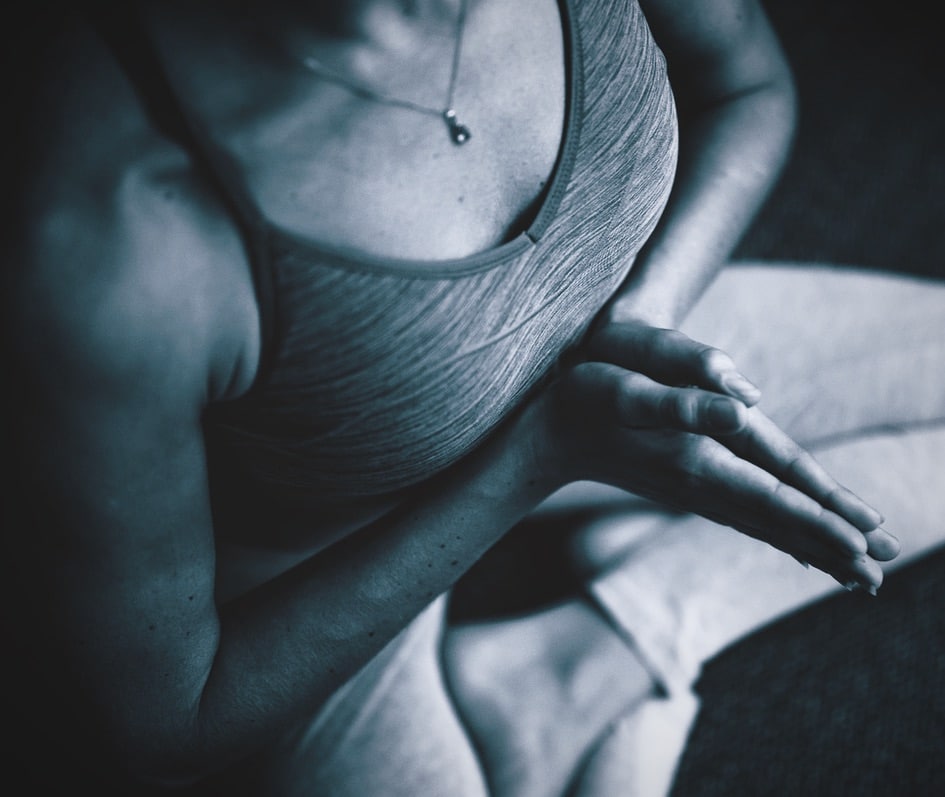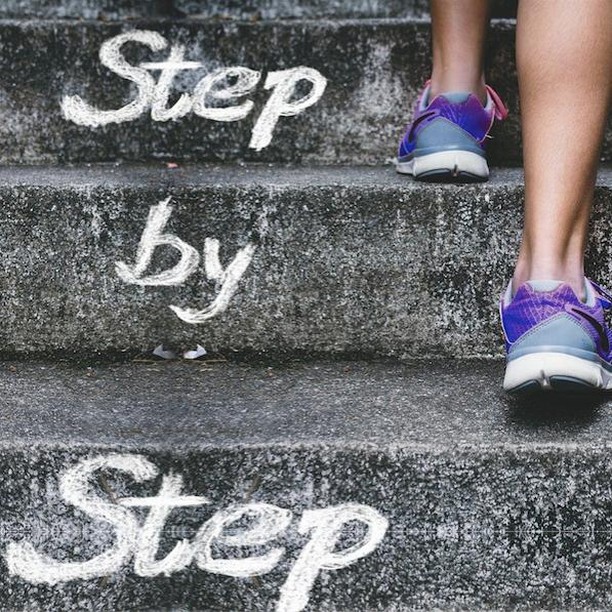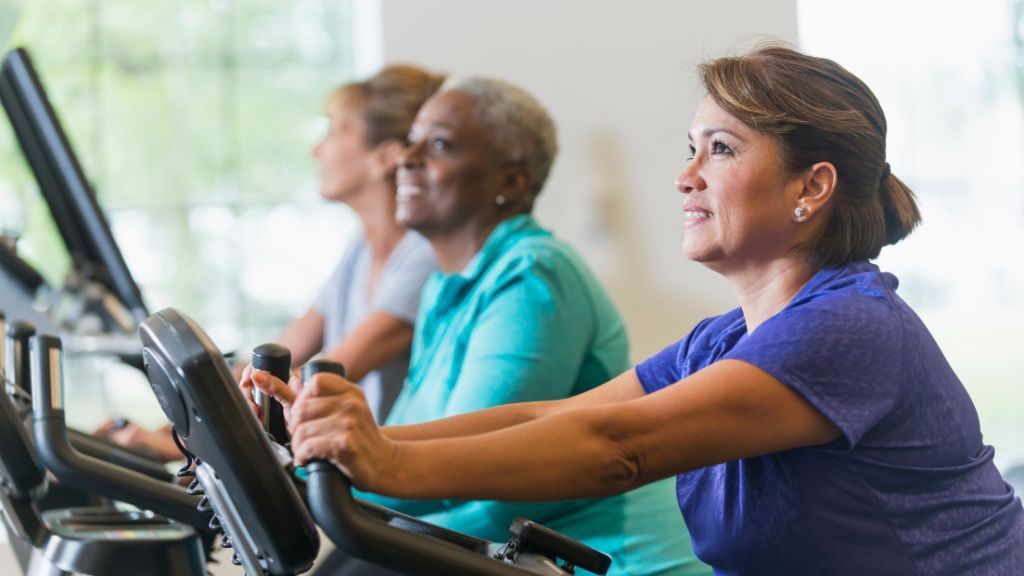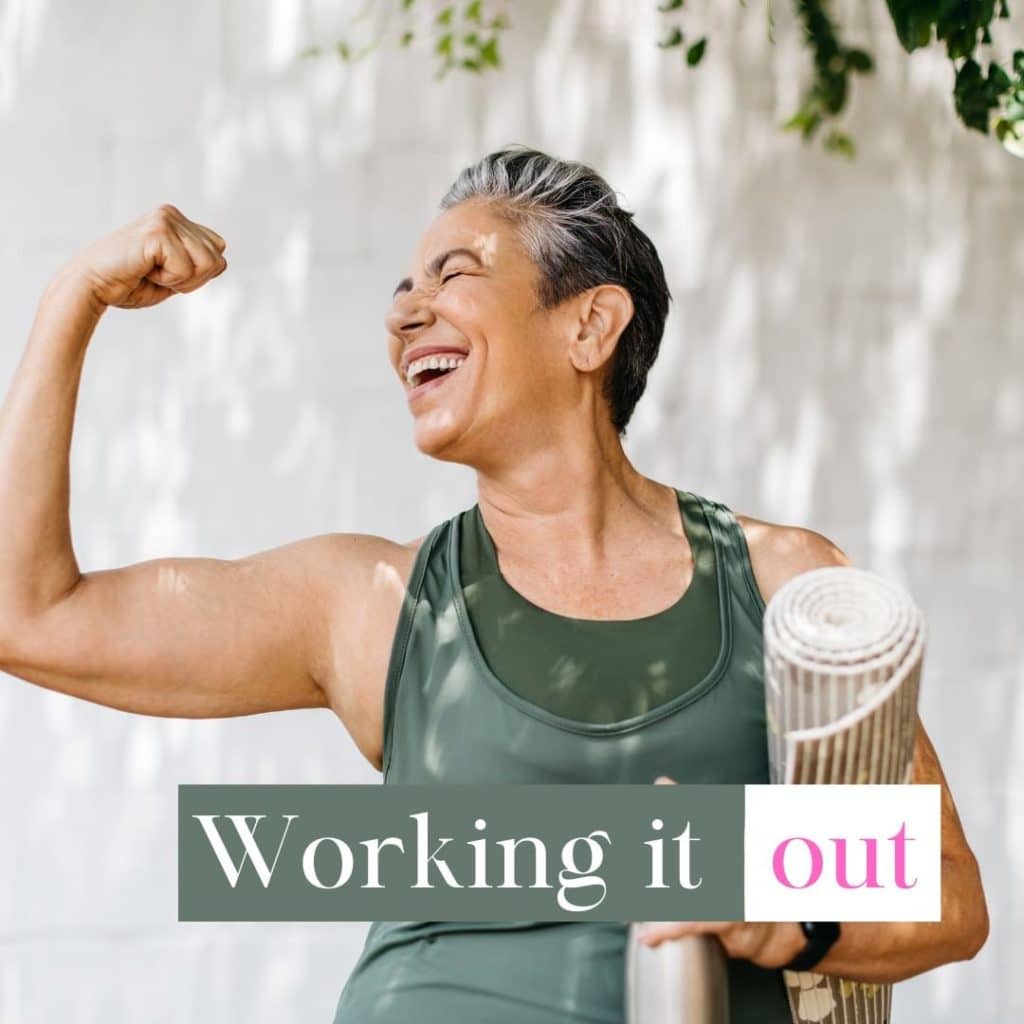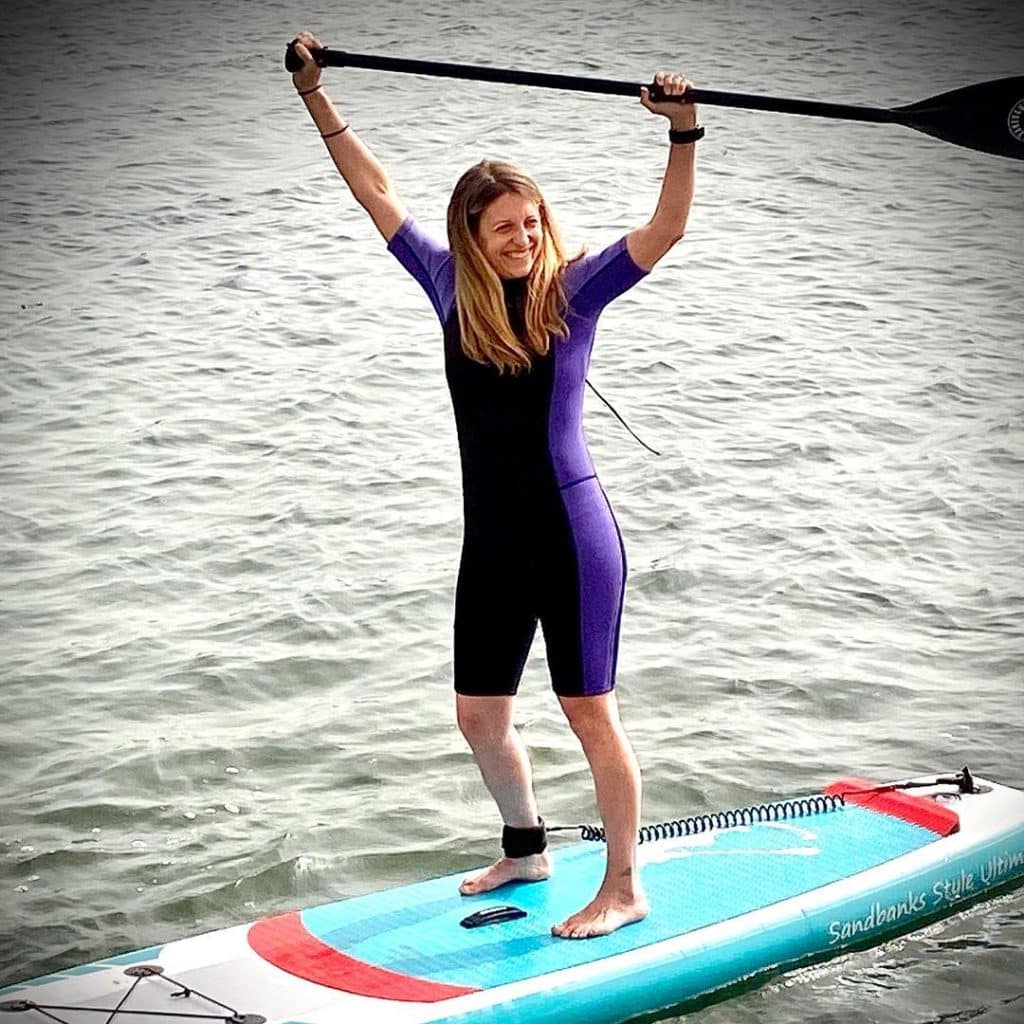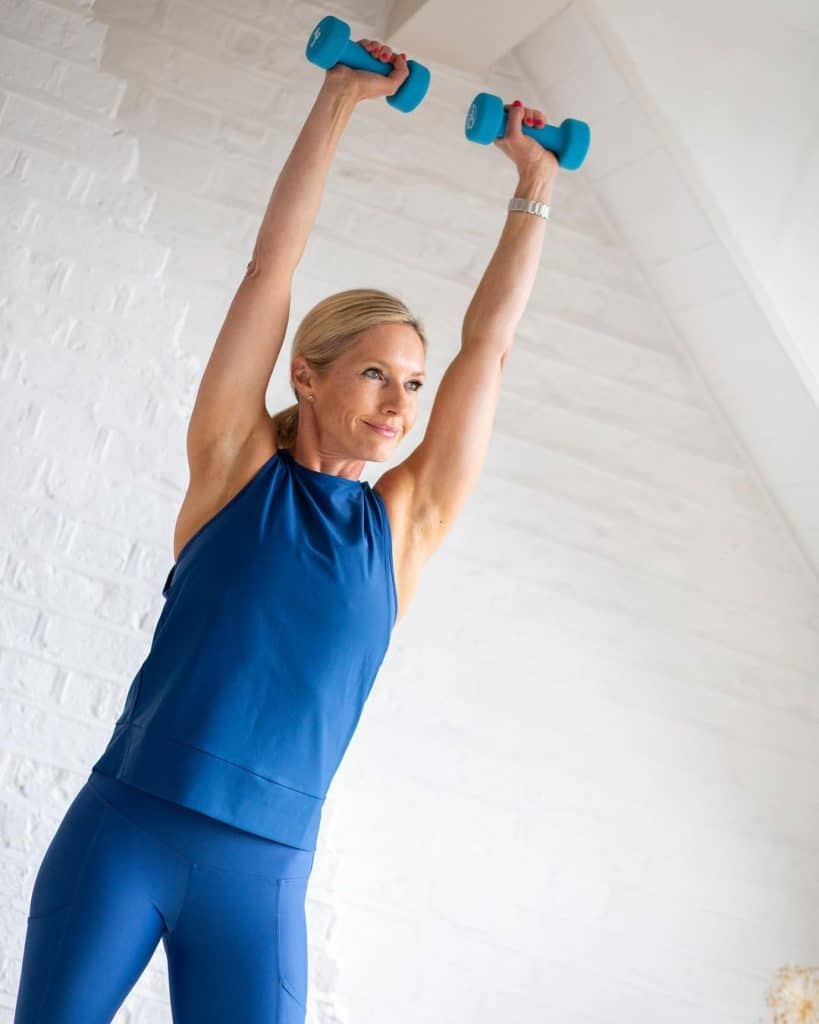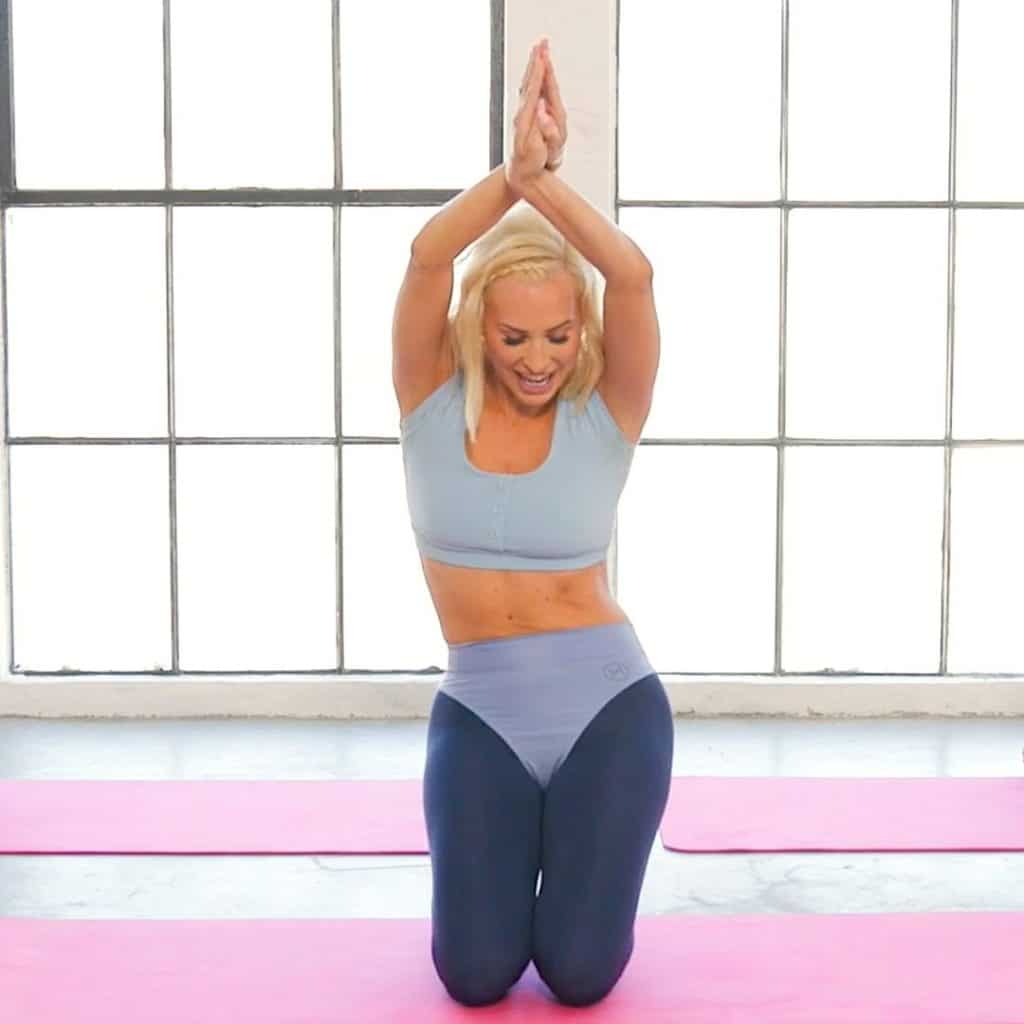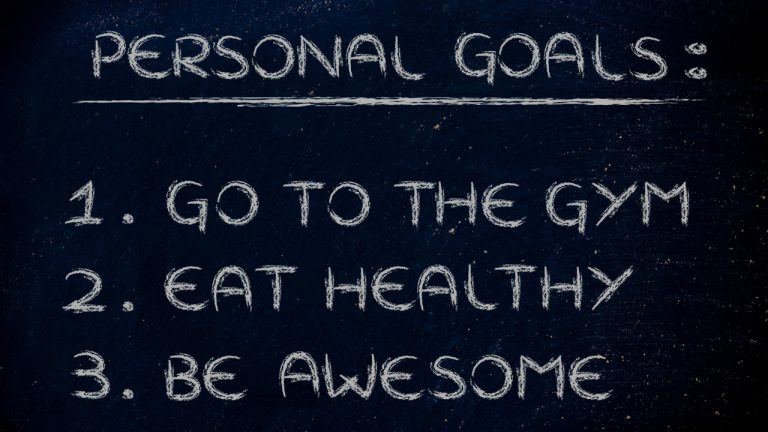Exercise And Menopause
The Menopause can be a really distressing time for any woman. You can face a barrage of information and not quite know what to do.
Menopause, and Perimenopause, are finally becoming topics that are being discussed – and although they are still not understood as they should, it is getting there. In this article we will discuss the Menopause, Perimenopause and how exercise can help these stages of life.
Menopause Explained

Menopause is when women have stopped menstruating. Officially, it is when you have not had a period for 12 consecutive months.
Menopause occurs when your hormone levels, particularly oestrogen, begin to decrease. It commonly occurs between the ages of 45 – 55 years old, however some women can go through the Menopause a lot earlier.
Early Menopause is classed as before age 45. Some women can experience this due to medical needs where the ovaries or uterus are needed to be removed. Having treatment such as chemotherapy can also cause an early Menopause.
For some, there is no obvious reason why this happens and it can simply be genetic.
Perimenopause Explained
This is a relatively new saying for a lot of people, but it is a very important part of the Menopuase journey.
It is the time when a woman starts to transition to the Menopause. It marks the end of the reproductive years, the ovaries produce less oestrogen and so the body begins a huge journey of change.
For some, Perimenopause can begin in your 30s, however the average age for this is 40 – 44 years old.
Perimenopause is the start of your hormone levels beginning to change, but your periods still happen. It can cause physical and mental symptoms and changes. Your periods may start to become irregular. This stage can last between 4 and 8 years.
Symptoms of the Menopause
There are some common symptoms of Menopause. They are;
- No periods for 12 consecutive months
- Hot Flushes
- Night sweats
- Low mood
- Anxiety
- Brain Fog
- Difficulty sleeping
- Low libido
- Vaginal dryness and discomfort
- Weight gain
Will Exercise Help The Menopause?
The part exercise plays in the Menopause isn’t too much about reducing some of the common symptoms but more about improving quality of life. Exercise is important throughout the Perimenopause and Menopause stage – just as it is prior to it.
We know that exercise boosts our Serotonin, which is responsible for our mood and giving it a boost. Therefore if we exercise to help our mood, we will reduce our stress and anxiety.
It is also worth noting that as we get older, a lack of oestrogen plays a part in the strength of our bones as a woman. We are more at risk of Osteoporosis. Therefore exercise such as strength training is key to help keeping our body’s strong.
We know now that exercise has mental and physical benefits for a woman during the Perimenopause and Menopause.
In summary they are:
- Increase energy
- Weight loss
- Increase bone density
- Cardiovascular health
- Improved mood
- Better sleep
What Type Of Exercise Should I Do During The Menopause?
There are a range of different types of exercise that can be helpful to perform during menopause. Let’s take a look.
Aerobic Exercise
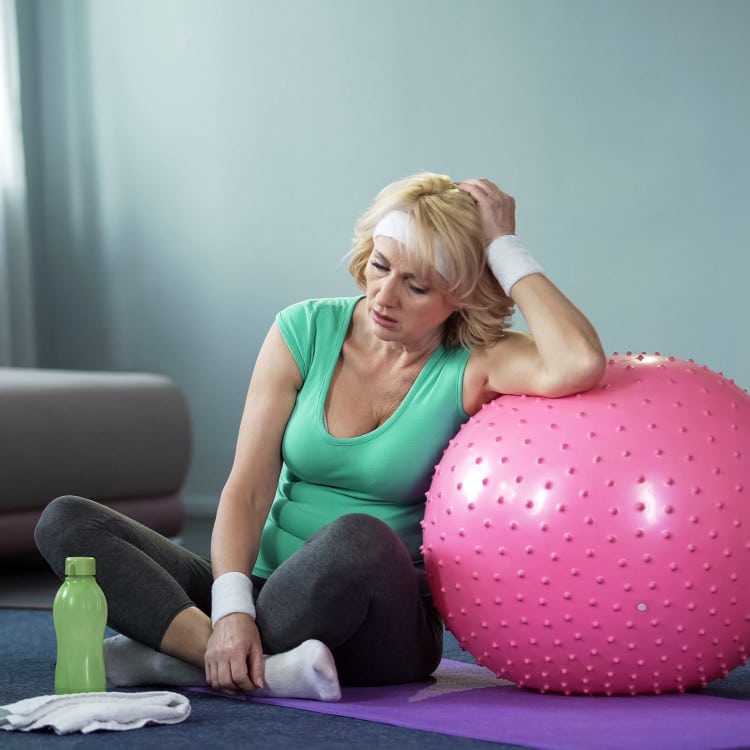
It is recommended that during the Menopause a woman should do two and half hours of Aerobic exercise per week. That, I know, almost instantly can sound overwhelming for anyone who is suffering an abundance of Menopausal symptoms.
Getting your heart rate up during the Menopause, and anytime in fact, will always have its health benefits. Oestrogen plays a role in protecting our heart so without as much, we are put in a situation where heart disease risk increases.
If the idea of including the recommended weekly aerobic exercise is overwhelming. Break it down into manageable sessions. I would recommend 20 – 30 minutes of aerobic activity a day.
What can we ‘class’ as aerobic activity?
- Brisk walking
- Running
- Swimming
- Cycling
- Aqua Aerobics
- Aerobic classes
Interestingly, the cliché ‘aerobics’ class that some people feel belonged to the 80s, is a perfect way to exercise at this stage. You want to have aerobic exercise that gets your heart rate up but also feels enjoyable. An aerobic, step or Zumba class is a perfect way to get in some cardio exercise.
The benefits of Aerobic exercise during the Menopause are huge to a woman during this stage of her life. The boost to your mood helps reduce the risk of depression, and also helps to improve sleep. Both, of which, are greatly affected by the Menopause. Aerobic activity will also reduce your risk of heart disease.
Strength Training
As I talked about before, involving weights as you get older as a woman is really important. One feeling some women get when they become ‘menopausal’ is that they feel less powerful.
It can happen quite quickly.
Oestrogen plays a role in maintaining our muscles. Once our levels start to decline so will our muscle mass. Strength training is a proven way of helping your body generate the cells needed to keep our muscles strong.
The Menopause slows down your metabolism. This is due to the loss of muscle mass. When we have less muscles, we burn less calories. Therefore, the need for strength training during the Perimenopause and Menopause is even more important.
Without it, our metabolic rate decreases which will lead to weight gain.
Your risk of Osteoporosis increases as your oestrogen levels decrease. Osteoporosis is a condition that weakens your bones, making them brittle and more likely to break. It develops over many years and is often only found when a sudden fracture occurs.
A woman’s bone density changes as you get older. It has been said that the Menopause speeds up bone loss and that 20% of bone loss happens during this time.
Preventing bone loss is really important to stop the development of Osteoporosis. Exercise and diet play a significant role here, as well as possible Hormone Replacement Therapy (HRT) for some.
Incorporating regular weight lifting and resistance training to your exercise regime will help strengthen your body during the Menopause. Get yourself some dumbbells for home workouts or add in the weight machines in the gym. Make sure you start with a low weight, with high repetitions and gradually increase from there.
Yoga
Yoga is a practice that attracts both men and women, young to old. It has benefits to all, and some can be really personal. The impact Yoga has on a woman experiencing the Menopause goes beyond just benefitting the body.
This is more about the mind.
We already know now, that the Menopause causes mood changes and increases stress levels. Some women will just feel ‘not quite themselves’. Yoga helps reduce these emotional symptoms, and brings about calm and relaxation during the Menopause, and Perimenopause.
Physically, Yoga can reduce blood pressure and relieve joint pain in the body. It will help strengthen your muscles and bones, therefore reducing the risk of Osteoporosis. Stretching the body will improve your flexibility, as well as help the muscles recover from any strength training.
However, where it seems to get most of the kudos, is how it positively impacts your mind when you are experiencing all that the Menopause is. Some consider it a natural remedy that helps women support their mood and mental state. This is turn, will improve the quality of your sleep.
Breath Work and Meditation
Breath work and Meditation for some, go hand in hand with Yoga. However, they can be separate practices.
Breath work is known as deep, diaphragmatic breathing. It consists of breathing exercises or techniques that allow responses in the body that benefit our health and wellness. Meditation is simply about focusing or clearing the mind, allowing you to get a calm and new perspective.
Both of these practices are good ways to improve our health and wellbeing when we are overcome with stress and/or anxiety. However, many women have found that breath work and meditation have reduced the symptoms of hot flushes.
If you feel you are perimenopausal or are in the thick of the Menopause, I would recommend finding a local Yoga class and speaking with an experienced instructor. There are also many high-quality apps that you can use for breath work and meditation work.
The Importance Of The Pelvic Floor
When it comes to the Women’s Health, there are a group of muscles that must be considered. Those being the Pelvic Floor Muscles. Just as we have discussed, the Menopause will cause your muscles to weaken, this includes your pelvic floor.
The pelvic floor muscles are located in your pelvis, between the pubic bone and the tailbone. It can be likened to a hammock and is a group of muscles that support your uterus, bladder and colon.
Their job is to keep them in the correct position yet they can cause women many problems.
The Pelvic floor muscles can become weakened, slow and damaged. The causes can range from pregnancy, childbirth, constipation, being overweight and heavy lifting.
If they are damaged and weakened, you may experience:
- Leaking urine
- Urgency to pass urine
- Heaviness feeling
- Pain during sex
- Recurring UTIs
- Constipation
As women get older, amongst everything else, pelvic floor health is important to be aware of. The Menopause will impact them and it is imperative that you consider them in whatever your ‘exercise regime’ may be.
Make sure to make the time for pelvic floor exercises and if you are concerned then make contact with your GP.
In Summary
Whilst the Menopause is an overwhelming time of transition for any woman, it does not need to feel like an ending. With the right support, diet and lifestyle changes, it can be for most if not all, a new chapter in your health journey. It is something you can control and manage.
If you have not included exercise in your lifestyle before, then make sure you set yourself achievable goals. If the gym isn’t a place you feel comfortable in, then there are plenty of exercise options mentioned in this article that do not involve joining one.
There are plenty of supportive groups and charities out there that offer great advice. As well as your GP. If you are feeling that you’re Perimenopausal or are in the Menopause, seek out the correct help and advice for you.

